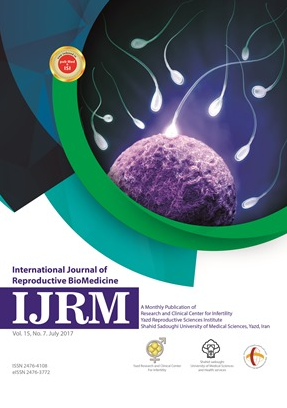
International Journal of Reproductive BioMedicine
ISSN: 2476-3772
The latest discoveries in all areas of reproduction and reproductive technology.
Maternal mid- and late-pregnancy distress and birth outcome: A causal model of the mediatory role of pregnancy-specific distress
Published date: Sep 03 2019
Journal Title: International Journal of Reproductive BioMedicine
Issue title: International Journal of Reproductive BioMedicine (IJRM): Volume 17, Issue No. 8
Pages: 585–590
Authors:
Abstract:
Background: There is lack of information about the effect of general distress and pregnancy-specific distress in mid- and late-pregnancy separately on neonatal outcome.
Objective: The aim of this study was to assess the effects of mid-maternal distress on late-maternal distress and birth outcomes with a causal model of relationships among general distress and pregnancy-specific distress.
Materials and Methods: In this longitudinal descriptive study, 100 low-risk pregnant women participated. Participants completed three questionnaires at mid-pregnancy (13–26 wk) and at late pregnancy (27–40 wk). Pregnancy-general distress was assessed by the Perceived Stress Scale and the Hospital Anxiety Depression Scale. Pregnancy specific distress was evaluated by the Prenatal Distress Questionnaire. The pregnant women were followed to after birth and neonatal outcome were assessed.
Results: All total effect pathways were significant as predictors of birth outcomes (height, weight, and head circumference). Mid-pregnancy-specific distress had a significant relationship with late pregnancy-specific distress. However, mid-maternal distress was not related directly to birth outcomes. The effect of mid-maternal distress on birth outcomes was related indirectly to late-maternal distress. Both late general distress and late pregnancy-specific distress had direct negative effects on three indexes of birth outcome. The negative effect of late general-pregnancy distress and mid-pregnancy-specific distress on birth outcome was mediated through late pregnancy-specific distress.
Conclusion: Both late pregnancy-general distress and pregnancy-specific distress have negative effects on birth outcomes. These findings support a role for negative effect as mediating the relationship between late pregnancy-specific distress and birth outcomes.
References:
[1] Faramarzi M, Pasha H, Khafri S, Heidary S. The factor structure and psychometric properties of the persian version of the revised prenatal coping inventory (Nu-PCI). J Clin Diagn Res 2017; 11: QC17– QC20.
[2] Pasha H, Basirat Z, Hajahmadi M, Bakhtiari A, Faramarzi M, Salmalian H. Maternal expectations and experiences of labor analgesia with nitrous oxide. Iran Red Crescent Med J 2012; 14: 792–797.
[3] Stewart DE. Clinical practice: Depression during pregnancy. N Engl J Med 2011; 365: 1605–1611.
[4] Nath A, Murthy GVS, Babu GR, Di Renzo GC. Effect of prenatal exposure to maternal cortisol and psychological distress on infant development in Bengaluru, southern India: a prospective cohort study. BMC Psychiatry 2017; 17: 255.
[5] Yali AM, Lobel M. Stress-resistance resources and coping in pregnancy. Int J Anxiety, Stress & Coping 2002; 15: 289–309.
[6] Faramarzi M, Amiri FN, Rezaee R. Relationship of coping ways and anxiety with pregnancy specific-stress. Pak J Med Sci 2016; 32: 1364–1369.
[7] Faramarzi M, Pasha H. The role of social support in prediction of stress during pregnancy. J Babol Univ Med Sci 2015; 17: 52–60.
[8] Skouteris H, Wertheim EH, Rallis S, Milgrom J, Paxton SJ. Depression and anxiety through pregnancy and the early postpartum: an examination of prospective relationships. J Affect Disord 2009; 113: 303–308.
[9] Faramarzi M, Pasha H. Psychometric properties of the Persian version of the Prenatal Distress Questionnaire. Social Behavior and Personality: An International Journal 2018; 46: 815– 822.
[10] Henriksen RE, Thuen F. Marital quality and stress in pregnancy predict the risk of infectious disease in the offspring: the norwegian mother and child cohort study. PloS One 2015; 10: e0137304.
[11] Tegethoff M, Greene N, Olsen J, Schaffner E, Meinlschmidt G. Stress during pregnancy and offspring pediatric disease: A national cohort study. Environ Health Perspect 2011; 119: 1647–1652.
[12] Borders AE, Grobman WA, Amsden LB, Holl JL. Chronic stress and low birth weight neonates in a low-income population of women. Obstet Gynecol 2007; 109: 331–338.
[13] Akiki S, Avison WR, Speechley KN, Campbell MK. Determinants of maternal antenatal state-anxiety in mid-pregnancy: Role of maternal feelings about the pregnancy. J Affect Disord 2016; 196: 260–267.
[14] Huizink AC. Prenatal stress and its effects on infant development. Academic Thesis, University Utrecht. The Netherlands; 2000; 1– 217.
[15] Servili C, Medhin G, Hanlon C, Tomlinson M, Worku B, Baheretibeb Y et al. Maternal common mental disorders and infant development in Ethiopia: the P-MaMiE Birth Cohort. BMC Public Health 2010; 10: 693.
[16] Davis EP, Sandman CA. The timing of prenatal exposure to maternal cortisol and psychosocial stress is associated with human infant cognitive development. Child Dev 2010; 81: 131–148.
[17] Hasanjanzadeh P, Faramarzi M. Relationship between Maternal General and Specific-Pregnancy Stress, Anxiety, and Depression Symptoms and Pregnancy Outcome. J Clin Diagn Res 2017; 11: VC04–VC07.
[18] Lobel M, Cannella DL, Graham JE, DeVincent C, Schneider J, Meyer BA. Pregnancy-specific stress, prenatal health behaviors, and birth outcomes. Health Psychol 2008; 27: 604–615.